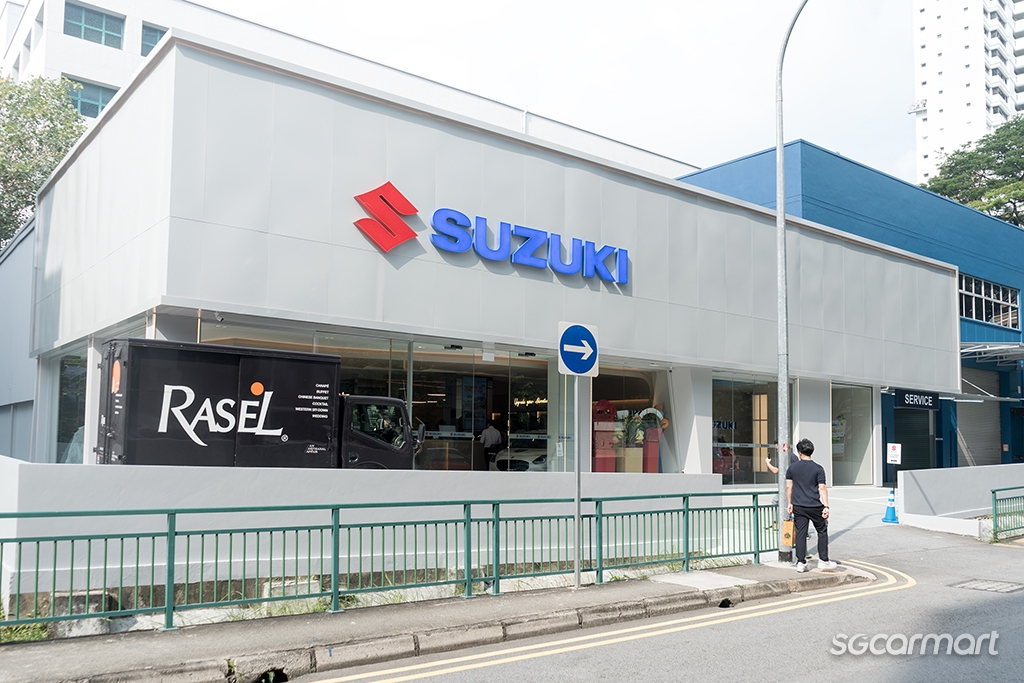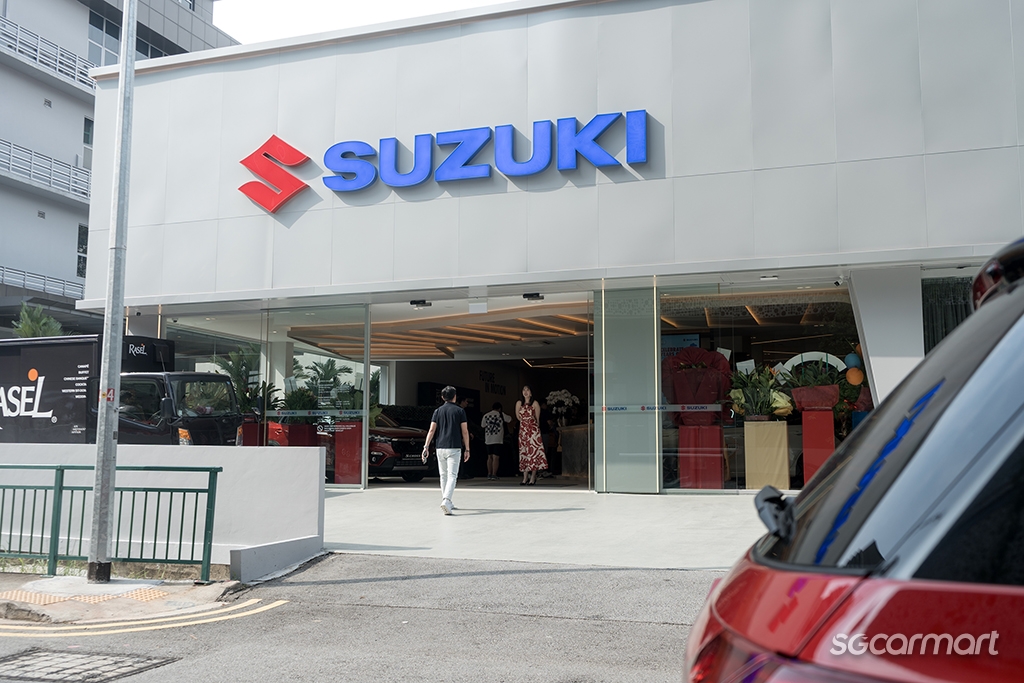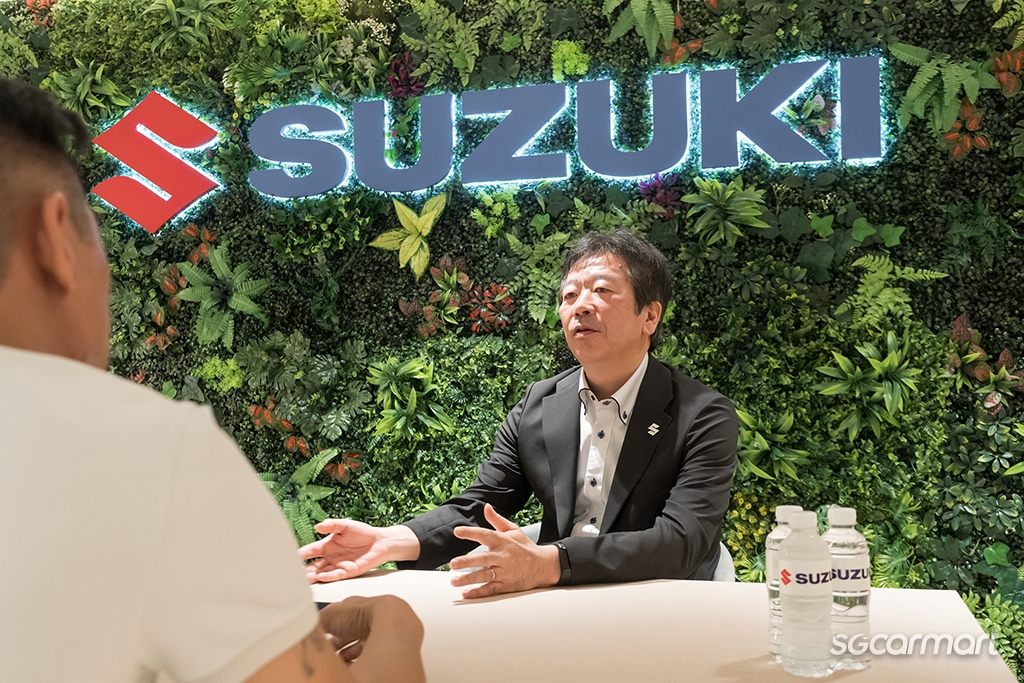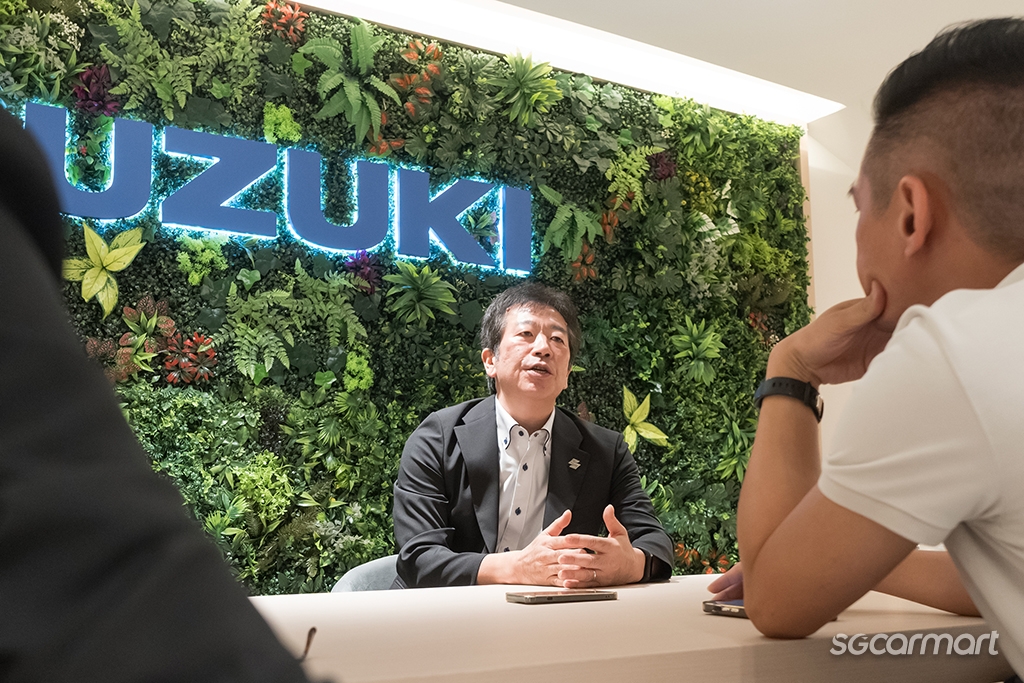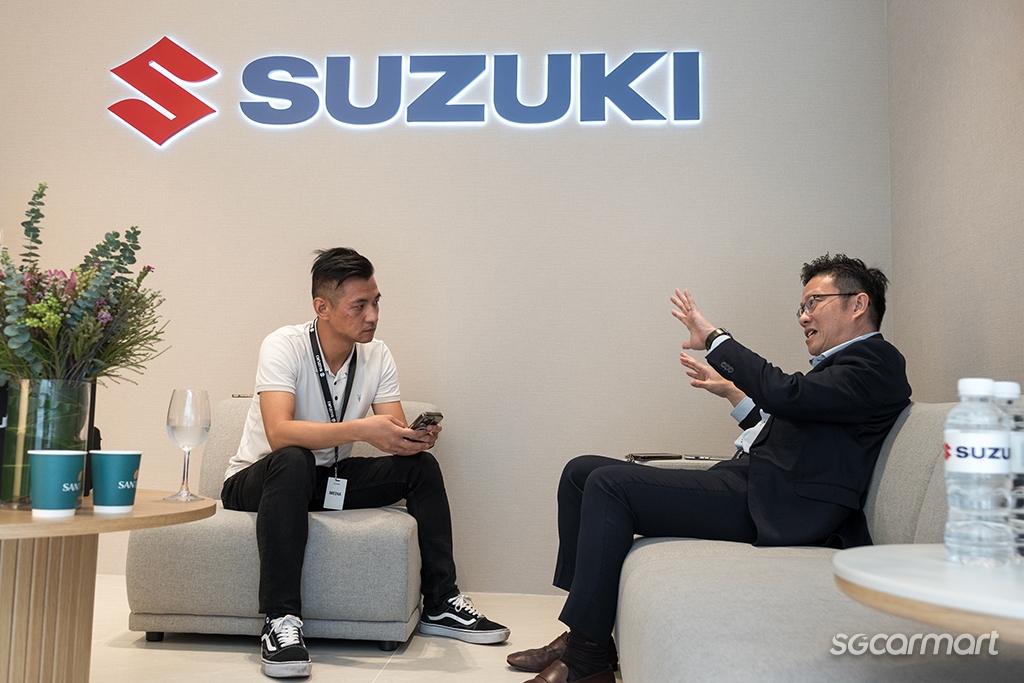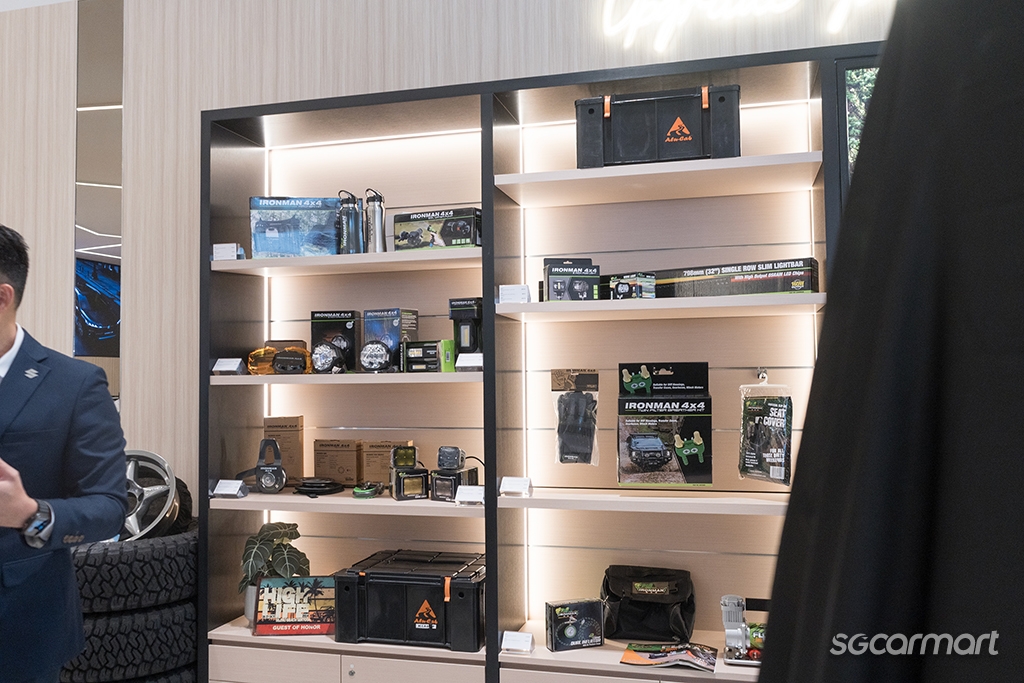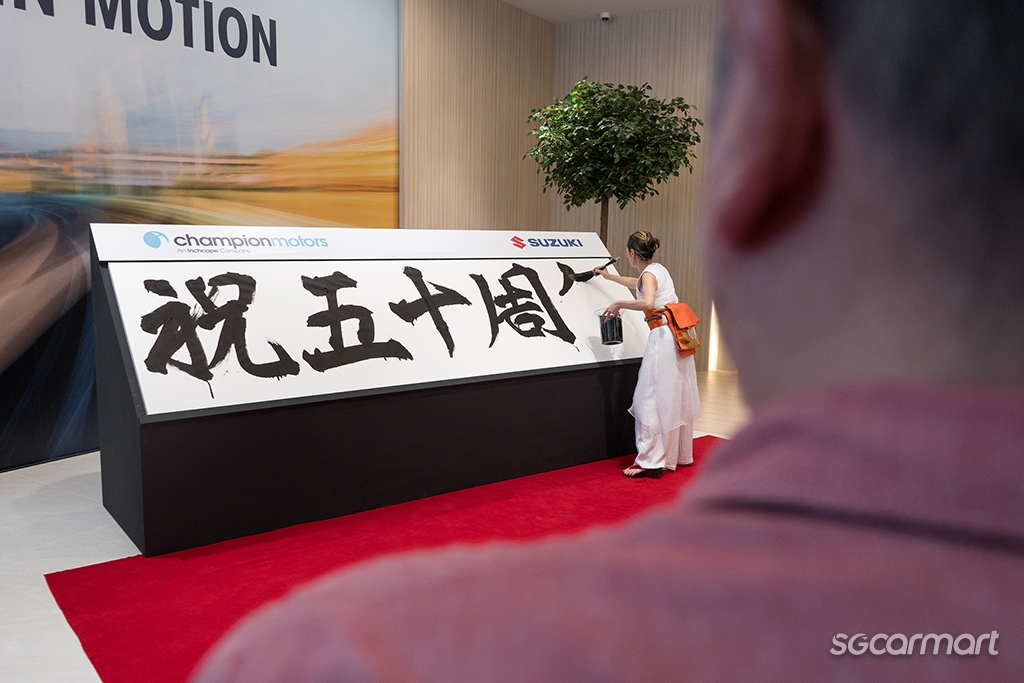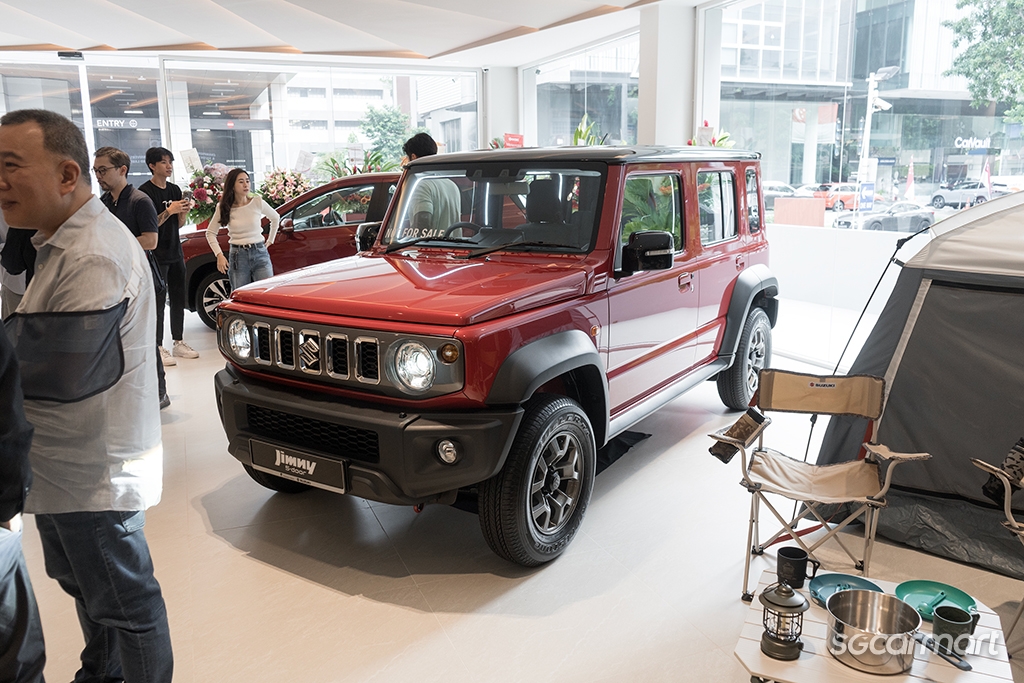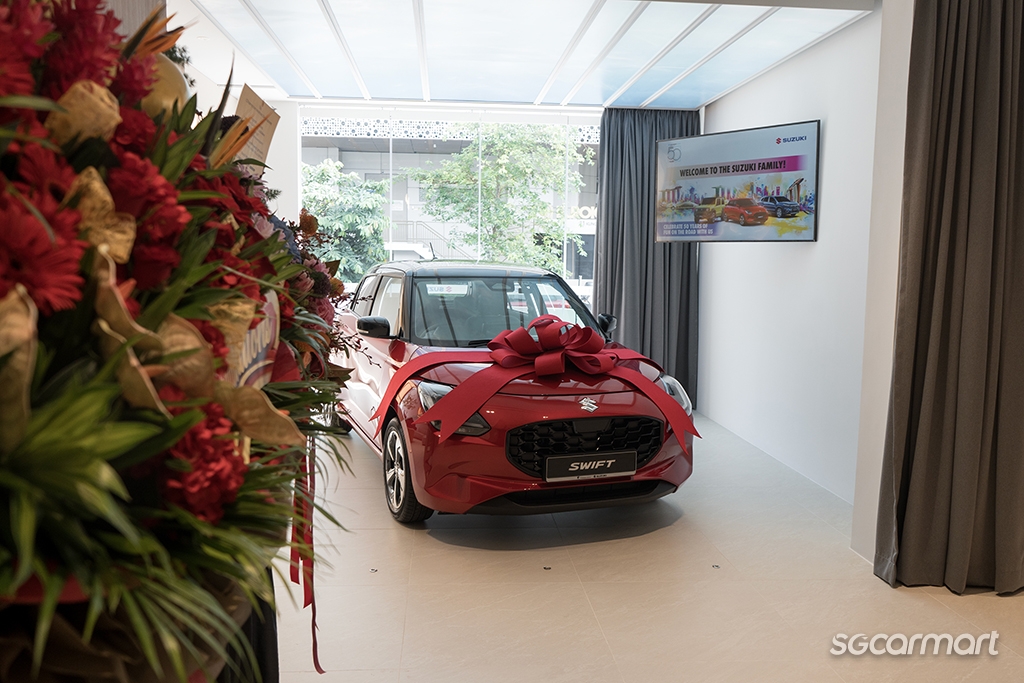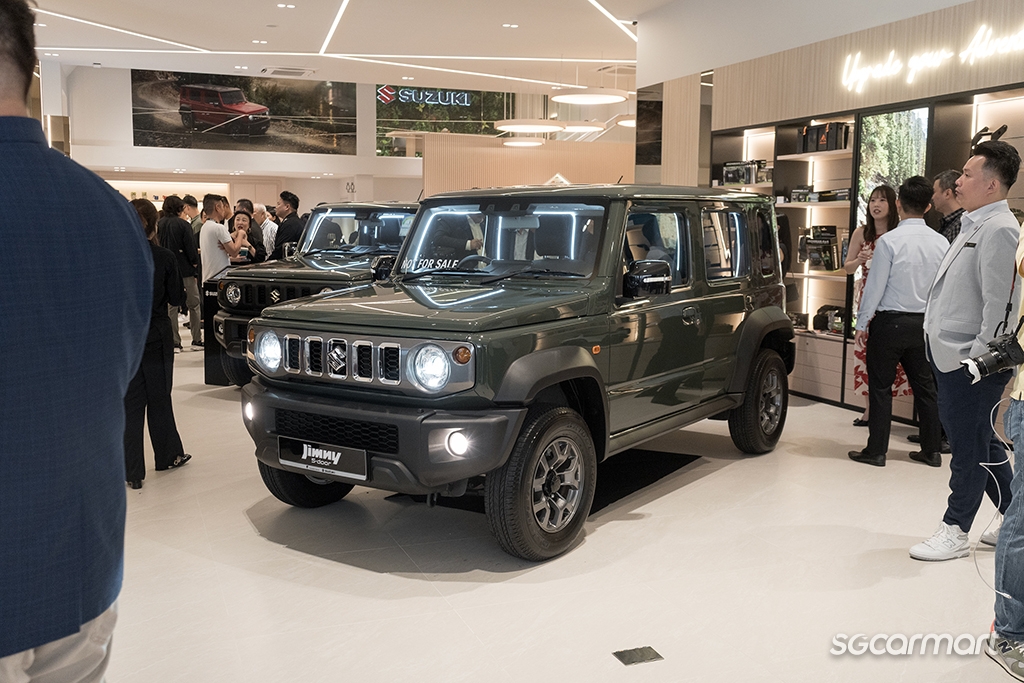Suzuki's road ahead: New products, more personality
03 Sep 2025|1,011 views
Small. Compact. Lightweight.
As Mr Masafumi Harano, Managing Officer and Executive General Manager (Automobile Marketing, Asia, Latin America, Oceania) of Suzuki Motor Corporation, tells us at the launch of the refreshed showroom, those characteristics are the "core competency" of Suzuki's products.
As Champion Motors Singapore (CMS) and Suzuki celebrate half a century of partnership here in Singapore, it's worth taking stock of the brand's place in our market, and look ahead to what's to come.
The opening of the new showroom also marks 50 years of partnership between Suzuki and Champion Motors Singapore
A morphing landscape
50 years is undoubtedly a long time. Singapore's automotive market has evolved greatly, and so too has the fortunes of the Suzuki brand.
Nameplates like Vitara, Baleno, Swift and Ignis should be plenty familiar to people coming of age in the 90s and 00s, while the occasional Jimny wouldn't be too uncommon (and perhaps even a rare Cappuccino sighting!).
Fast forward to the 2020s, and the landscape looks quite different. Dominated by big SUVs and with the recent EV boon, Singapore roads feel like a more daunting gauntlet for the brand (you certainly don't see as many Suzukis on the road anymore).
But CMS Managing Director Ng Khee Siong is unfazed. With the latest range of products, there's a distinct effort to lean into a specific and targeted character. "Suzuki has definitely evolved over the past 10 years or so […] we're also seeing a younger crowd coming in, attracted by a car that allows them greater self-expression. I think Suzuki, given its fun, adventure vibes, does attract some of this younger crowd, who want a car with greater character and expression."
Combining heritage and freshness
"Since the beginning, we see the Singapore market as a great showcase of the brand. We're not expecting huge volume, but it's an important location to showcase the Suzuki experience and the fun way of life", says Mr Harano.
While the brand has plenty of success in other markets (such as with its kei cars in Japan), Singapore is a different market altogether, and a deeply challenging one at that. And there's no denying that the brand's fortunes in recent years have been waning - evident not just in sales numbers, but also in the shrinking product lineup.
Any brand is inevitably driven by its products, and there's no denying that Suzuki’s products stand slightly apart from conventionality.
In the current SUV-dominant age, and in an age where cars grow ever larger with each passing year, Suzuki's current stable - a compact hatchback, compact crossover and compact off-roader - seems almost counter-culture.
Suzuki is wholly committed to the compact segments, while having to also explore new technologies. From mild hybrid, full hybrids, battery EVs and even bio gas, Suzuki's approach to product development is guided by carbon reduction in a broader sense - life cycle assessment rather than simply tailpipe emissions, notes Mr Harrano.
And different markets require different solutions, depending on the exact market conditions. As he highlights, energy generation also differs greatly from country to country (burning coal versus hydropower have very different carbon outcomes), and concurrently EV adoption is still currently driven in significant part by government incentives, which cannot go on indefinitely.
Suzuki's current primary solution now is mild hybridisation - now found across most of its product range. Moving forward, the brand's multi-way approach continues: Suzuki'sfirst fully electric model has already been introduced globally, and down the road, there may be stronger hybrids especially if costs become less expensive as well, Mr Harrano adds.
And yes, the brand's commitment to small, lightweight cars won't change - particularly because that's instrumental to reducing any car's carbon footprint, regardless of powertrain.
Mr Ng notes that CMS is focused on delivering an elevated customer experience alongside greater customisation options that better blend product and lifestyle
Dedicated cause
Product strategy must work in tandem with the customer experience. "This is why we also build a very strong aftersales service," says Mr Ng. "We want to make sure that when you buy the car, it's not just affordable upfront, but you also know that the ownership is well protected, and your car continues to retain its value even when you trade in and get a new car."
And CMS is certainly leaning into legacy and identity. "I think the biggest strength of Suzuki is identity," says Mr Ng. "The brand has a legacy built on quality, reliability and affordability, and we are trying to layer on new dimensions that retains the core identity, while also moving with the times."
Besides just new products to come in the future, the new showroom makes clear a renewed lifestyle focus. From rugged car accessories to camping gear, to greater customisation available on new models, the 'Suzuki life' is evidently more than just four wheeled transportation. As Mr Ng tells us, the big business objective is to be able to meld technology and identity, product and lifestyle.
As CMS and Suzuki celebrates 50 years in Singapore, the road ahead will be paved with new products and a greater emphasis on character and personality
Specific ways
Just like its cars, Suzuki's footprint in the Singapore market will likely continue to be relatively small and compact.
The brand's key strengths - making compact, affordable and reliable cars - are best realised in other markets that favour what the brand can offer (India alone accounted for over half of all of Suzuki's global sales in 2024, helped by local production; the brand's kei cars account for 82% of its domestic sales).
In Singapore, the environment is starkly different. With soaring COE premiums and changing market tastes, Suzuki will likely never achieve the same kind of volume it once did. 10 years ago, the Suzuki population in Singapore stood at 14,214. In 2024, just 4,823 are left on our roads.
Even with evolving technology and customer tastes, Suzuki is committed to small, compact and lightweight cars, catering to the group of customers that seek out these particular traits
And so the brand must lean into this more targeted approach.
New things are on the way, in the form of new products (the fully-electric e Vitara is slated to be launched at the upcoming Motor Show) or new events and activations within the refreshed showroom to engage with existing customers and reel in new ones alike.
And while the appeal may skew towards niche, Mr Harrano highlights that there are customers that do look for the kinds of products that Suzuki can deliver. "That customer always exists in any market, and Singapore too. We are trying to appeal our strengths."
Whether that will be enough, only time will tell. But one thing is for sure: If you wanted a small, compact and rugged off-road capable car just dripping with personality and character, well, only Suzuki can offer you a Jimny.
Small. Compact. Lightweight.
As Mr Masafumi Harano, Managing Officer and Executive General Manager (Automobile Marketing, Asia, Latin America, Oceania) of Suzuki Motor Corporation, tells us at the launch of the refreshed showroom, those characteristics are the "core competency" of Suzuki's products.
As Champion Motors Singapore (CMS) and Suzuki celebrate half a century of partnership here in Singapore, it's worth taking stock of the brand's place in our market, and look ahead to what's to come.
The opening of the new showroom also marks 50 years of partnership between Suzuki and Champion Motors Singapore
A morphing landscape
50 years is undoubtedly a long time. Singapore's automotive market has evolved greatly, and so too has the fortunes of the Suzuki brand.
Nameplates like Vitara, Baleno, Swift and Ignis should be plenty familiar to people coming of age in the 90s and 00s, while the occasional Jimny wouldn't be too uncommon (and perhaps even a rare Cappuccino sighting!).
Fast forward to the 2020s, and the landscape looks quite different. Dominated by big SUVs and with the recent EV boon, Singapore roads feel like a more daunting gauntlet for the brand (you certainly don't see as many Suzukis on the road anymore).
But CMS Managing Director Ng Khee Siong is unfazed. With the latest range of products, there's a distinct effort to lean into a specific and targeted character. "Suzuki has definitely evolved over the past 10 years or so […] we're also seeing a younger crowd coming in, attracted by a car that allows them greater self-expression. I think Suzuki, given its fun, adventure vibes, does attract some of this younger crowd, who want a car with greater character and expression."
Combining heritage and freshness
"Since the beginning, we see the Singapore market as a great showcase of the brand. We're not expecting huge volume, but it's an important location to showcase the Suzuki experience and the fun way of life", says Mr Harano.
While the brand has plenty of success in other markets (such as with its kei cars in Japan), Singapore is a different market altogether, and a deeply challenging one at that. And there's no denying that the brand's fortunes in recent years have been waning - evident not just in sales numbers, but also in the shrinking product lineup.
Any brand is inevitably driven by its products, and there's no denying that Suzuki’s products stand slightly apart from conventionality.
In the current SUV-dominant age, and in an age where cars grow ever larger with each passing year, Suzuki's current stable - a compact hatchback, compact crossover and compact off-roader - seems almost counter-culture.
Suzuki is wholly committed to the compact segments, while having to also explore new technologies. From mild hybrid, full hybrids, battery EVs and even bio gas, Suzuki's approach to product development is guided by carbon reduction in a broader sense - life cycle assessment rather than simply tailpipe emissions, notes Mr Harrano.
And different markets require different solutions, depending on the exact market conditions. As he highlights, energy generation also differs greatly from country to country (burning coal versus hydropower have very different carbon outcomes), and concurrently EV adoption is still currently driven in significant part by government incentives, which cannot go on indefinitely.
Suzuki's current primary solution now is mild hybridisation - now found across most of its product range. Moving forward, the brand's multi-way approach continues: Suzuki'sfirst fully electric model has already been introduced globally, and down the road, there may be stronger hybrids especially if costs become less expensive as well, Mr Harrano adds.
And yes, the brand's commitment to small, lightweight cars won't change - particularly because that's instrumental to reducing any car's carbon footprint, regardless of powertrain.
Mr Ng notes that CMS is focused on delivering an elevated customer experience alongside greater customisation options that better blend product and lifestyle
Dedicated cause
Product strategy must work in tandem with the customer experience. "This is why we also build a very strong aftersales service," says Mr Ng. "We want to make sure that when you buy the car, it's not just affordable upfront, but you also know that the ownership is well protected, and your car continues to retain its value even when you trade in and get a new car."
And CMS is certainly leaning into legacy and identity. "I think the biggest strength of Suzuki is identity," says Mr Ng. "The brand has a legacy built on quality, reliability and affordability, and we are trying to layer on new dimensions that retains the core identity, while also moving with the times."
Besides just new products to come in the future, the new showroom makes clear a renewed lifestyle focus. From rugged car accessories to camping gear, to greater customisation available on new models, the 'Suzuki life' is evidently more than just four wheeled transportation. As Mr Ng tells us, the big business objective is to be able to meld technology and identity, product and lifestyle.
As CMS and Suzuki celebrates 50 years in Singapore, the road ahead will be paved with new products and a greater emphasis on character and personality
Specific ways
Just like its cars, Suzuki's footprint in the Singapore market will likely continue to be relatively small and compact.
The brand's key strengths - making compact, affordable and reliable cars - are best realised in other markets that favour what the brand can offer (India alone accounted for over half of all of Suzuki's global sales in 2024, helped by local production; the brand's kei cars account for 82% of its domestic sales).
In Singapore, the environment is starkly different. With soaring COE premiums and changing market tastes, Suzuki will likely never achieve the same kind of volume it once did. 10 years ago, the Suzuki population in Singapore stood at 14,214. In 2024, just 4,823 are left on our roads.
Even with evolving technology and customer tastes, Suzuki is committed to small, compact and lightweight cars, catering to the group of customers that seek out these particular traits
And so the brand must lean into this more targeted approach.
New things are on the way, in the form of new products (the fully-electric e Vitara is slated to be launched at the upcoming Motor Show) or new events and activations within the refreshed showroom to engage with existing customers and reel in new ones alike.
And while the appeal may skew towards niche, Mr Harrano highlights that there are customers that do look for the kinds of products that Suzuki can deliver. "That customer always exists in any market, and Singapore too. We are trying to appeal our strengths."
Whether that will be enough, only time will tell. But one thing is for sure: If you wanted a small, compact and rugged off-road capable car just dripping with personality and character, well, only Suzuki can offer you a Jimny.
Thank You For Your Subscription.



























